The Lucky Ticket: Americans Share Lottery-Winning Aspirations
Written by Jackpot Staff
November 27, 2023

Winning a lottery could be called the true American dream. With a simple online lottery ticket order that takes seconds, lives can be radically changed forever. Whether players spend a dollar or a hundred dollars, the result can be the same. And while the odds of winning a lottery are often described as astronomical, eventually someone does win the jackpot.
There are many stories about lottery winners and how their lives have changed since the big win. Some winners wish to remain private, while some states require that the name of the winners be made public.
Lottery winners need to make significant tactical decisions because payout terms can vary. Winners can usually choose a lump sum payment or an annuity that pays them an equal amount every year for a period of sometimes up to 30 years. The majority of winners do take the lump sum option, especially if they think that they may not live long enough to collect all of the yearly payouts.
There are also federal and state taxes to consider, but most lottery winners still end up with quite a tidy sum even after all taxes and obligations are taken care of.
Some lottery winners may be financial novices and feel that they need the help of a consultant, attorney, and an accountant. Others may seek advice about continuing to work in their present positions as winners worry that they might actually be bored without the fulfillment and interactions of their current job.
We wanted to explore how people would react to winning the lottery, so we surveyed 3,500 adult Americans to find out:
- If they would be stressed out by winning a lottery.
- What their top priorities would be such as paying off debt, investing, or saving for retirement.
- If they would make a big purchase.
- If they thought winning the lottery would make them happier.
- If they would hire an attorney and/or financial manager to help them navigate their new situation.
- When and how much they would donate to charity.
Our survey yielded a lot of interesting stats, so let’s get into it.
Summary of Key Findings
- 40% said they would first pay off debt with lottery winning; 25% said buying a car would be the first thing they’d spend money on.
- 42% said they would tell people about their winnings within one month.
- 78% said they would continue to work after winning the lottery.
- 51% said they would hire a financial advisor; another 39% said they would manage the money on their own.
- 52% said they would hire an attorney and an accountant to help them navigate the lottery winning process.
- 92% said they would definitely make a big purchase after winning the lottery.
- 87% said they would donate some portion of their lottery winnings to charity.
- 62% said they were confident they have the skills and knowledge needed to manage their own money after winning the lottery.
- 66% said that winning the lottery would make them a happier person.
- 41% said that the stress that would come with winning the lottery might make them less happy overall.
- Respondents said that their top priorities after winning the lottery would be: paying off debt, saving for retirement, and diversifying their investment portfolio.
Planning & Money Management
When a lottery winner is announced, people naturally want to find out who the lucky person was. For various legal, accounting or just personal reasons, some lottery winners take a while to come forward to claim their prize. We first asked our respondents how soon they would tell people that they were the lucky winner.
An overwhelming plurality - 43% - said that they would never tell anyone that they had won. Almost 15% reported that they would reveal their secret within 6 months to a year. Almost 16% felt that they would come forward within a week while only 12% would spread the good news immediately.
Money management is of course a key concern as stories abound about those winners that quickly squandered their fortunes on dubious investments. Our survey confirmed this fact as a 51% majority said that they would hire a financial advisor after winning the big prize.
But a significant number - 38% - said that they were comfortable handling the winning themselves. Only 5% would reach out to family and friends, and another 5% revealed that they were not concerned about money management.
People love consultants, and a whopping 81% said that they would definitely or at least maybe consider hiring an attorney and an accountant to help guide them through the challenges of sudden wealth.
Almost 18% of our respondents maintained that they would not need any outside help in determining how to handle their lottery winning.
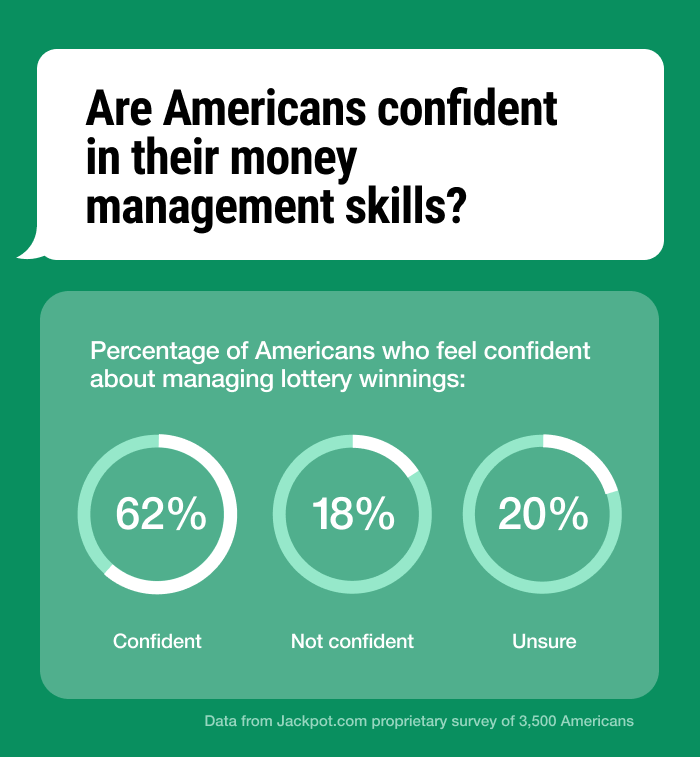
The mechanics of preserving the winning lottery ticket, actually turning it in, collecting the money, paying taxes, and setting up investment and savings accounts are significant tasks. 61% of our respondents were confident or very confident that they could handle the issues that winning the lottery presented. And while 16% worried that they were not up to the task, almost a quarter of survey takers expressed no opinion about their confidence level regarding lottery winning challenges.
We wanted to drill down and ask if survey-takers thought that they had the knowledge and skills to manage lottery winnings. Here again, 60% said yes, about 18% said no and 20% were neutral.
Spending Plans
When they hear of a lucky lottery winner, people may fantasize about what they would do if they won the big prize. We wanted to know what survey-takers would do first with their lottery winnings.
Paying off debt was the number one answer as just over 40% said that’s what they would do first. A quarter of survey takers said that they would initially buy a house with their winnings.
Almost 10% would share their new-found money with family and friends followed by 8% who would buy a car.
Surprisingly, only 6% said that they would consider starting a business while another 6 percent said they would save for retirement.
4% of our survey respondents did say that they would give money to charity.
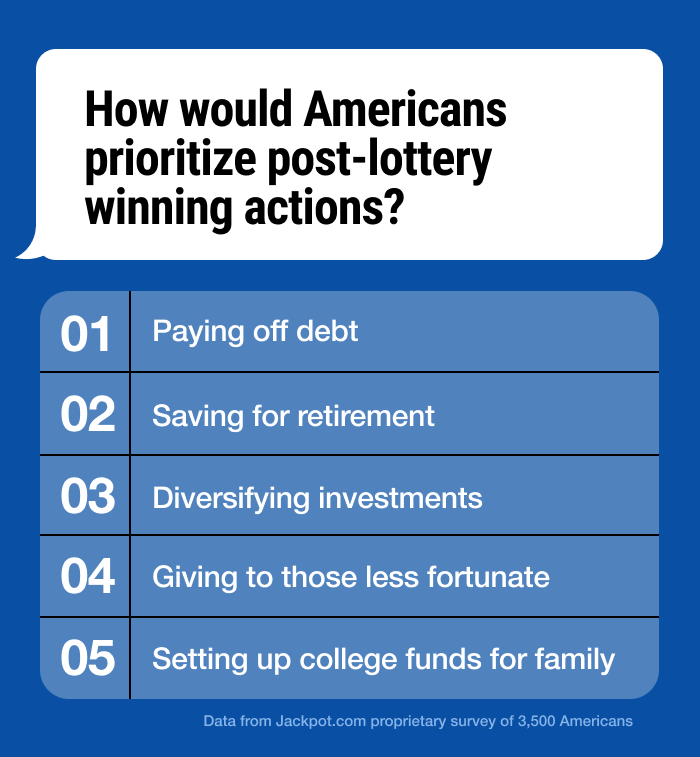
Since many people have thought about exactly what they would do with lottery winnings, we wanted to know how quickly they would put their plans into action. A hefty 88% revealed that they would make a big purchase within a year of collecting their prize money.
Breaking that down further, of that 80%, almost 23% would make the purchase immediately, 31% would wait a month, 23% would hold off for 2 to 5 months and 11 percent would wait until they were within a 6 to 12 month timeframe.
4% told us that they would wait more than one year to purchase a big item and only just under 8% replied that they wouldn’t commit to making a big purchase after winning the lottery.
Lottery winners do carefully consider what they would do with their winnings. Just because someone has suddenly pocketed millions of dollars doesn’t necessarily mean that irresponsible money management will follow. When asked what they would do first after a lottery win, potential winners said that paying off debt was the number one priority followed by saving for retirement, diversifying existing investments, setting up college funds and giving to the less fortunate. The least popular item was quitting one’s job, as again, the no-more-work-option just does not seem to be on the top of our survey taker’s list.
Work or Quit
Having established that many lottery winners would not instantly quit their jobs, we were curious as to the reasons behind this. We asked survey-takers what the main reason to keep working would be.
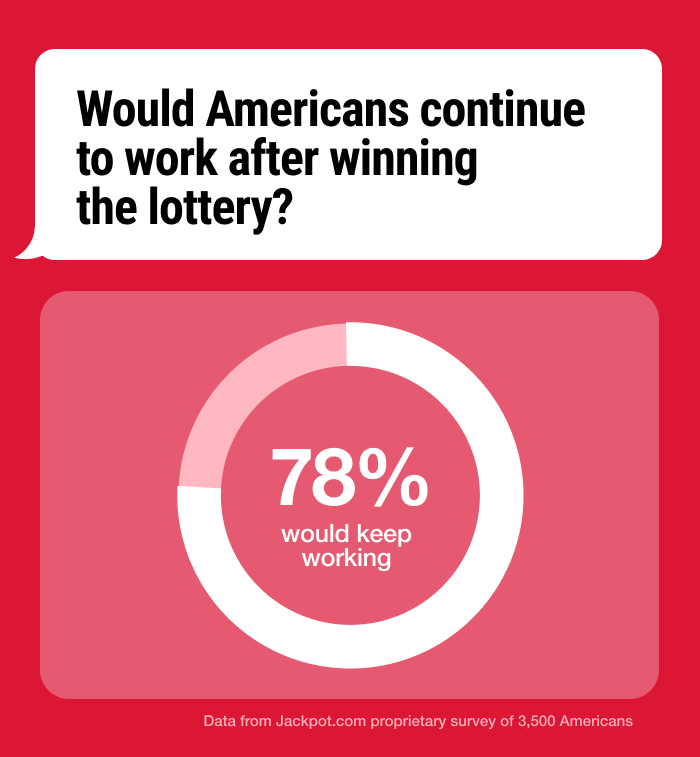
To start, 78% of our respondents indicated that they would continue to work after winning the lottery — an overwhelming majority. Clearly, American lottery players aren’t interested in a work-free life even if lottery winnings make that possible.
But why? Well, 30% pointed to the sense of accomplishment and purpose their job gave them. 21% were still concerned about having a separate income stream outside of lottery winning. 15% said they would just be bored if they didn’t have a job and 9% of respondents said that they would keep their job in order to get out of the house. A small number said that they would miss their co-workers. Only 20% affirmed that they would not continue working after a big lottery win.
Sharing & Charity
Lottery winners can be generous and we wanted to find out how they would decide to share their winnings with others.
To start, 7% said they would simply give money to charity while another 27% replied that they would save part of their winnings for others.
Almost 35% said that they would directly spend money on others. And only a very small portion - just over 10% - said they would spend the money on themselves or just save it all.
To dig deeper into the charitable aspect of winning the lottery, we asked how much money winners would donate. To start, we uncovered that 87% of our respondents would indeed donate some of their money to charity — a very giving and helpful group.
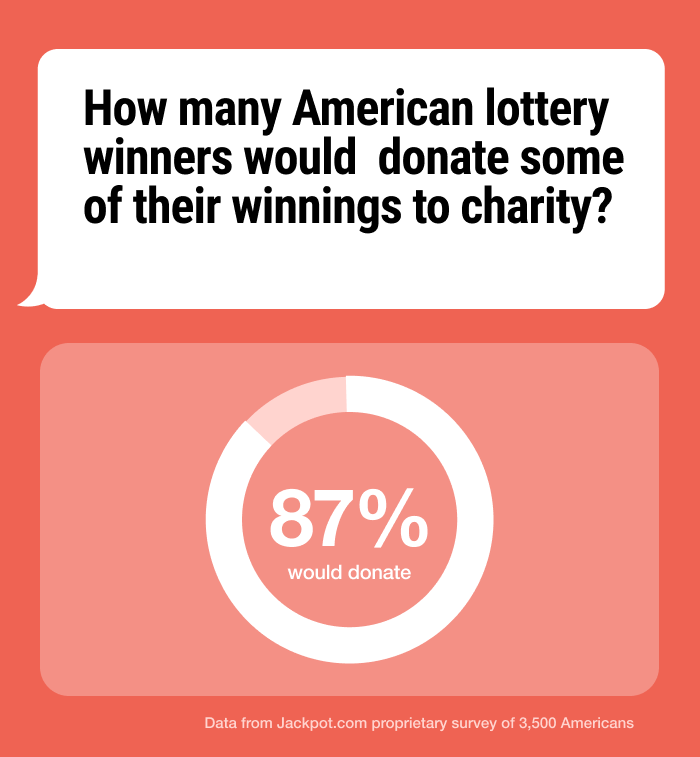
Additionally, what amount of their prize would lottery winners donate?
A solid third said they would donate 10% - a standard advanced by many religious institutions. A quarter of survey-takers would donate 5% of the winnings to charity. Only 12% of our respondents said that they would decline and not donate.
About 4% of winners would give between 25 and 50 percent of their prize money to the less fortunate through charity.
Almost 9 percent agreed that they would give 15% and another almost 9% would part with 20% of their haul.
Interestingly, slightly over 1% claimed they would give away more than 50% of their winnings, and a small percentage of survey-takers, less than 1%, said they would give it all away.
Attitude & Happiness
News sources like to circulate stories about lottery winners gone bad, but those we surveyed seemed to take those reports in stride. When we asked if winning the lottery would make them a happier person, 66% agreed or strongly agreed. Only 10 percent worried that winning the lottery might not make them happier and 25% had no opinion.
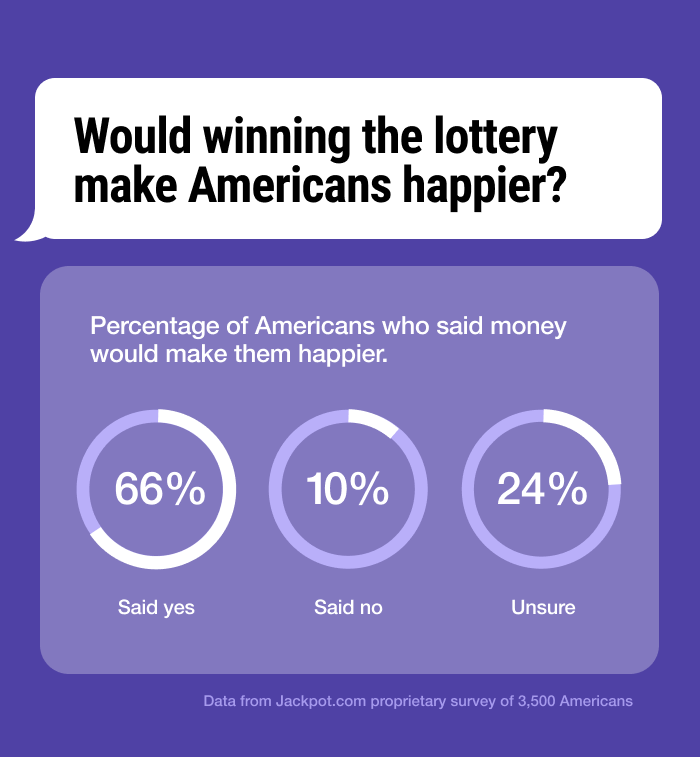
When we drilled down and asked bluntly if winning a ton of money would make respondents feel overwhelmed and less happy, we got similar results as almost 59% said no, 26% had no opinion, and only about 15% agreed that they might be overwhelmed and unhappy if they hit it big.
Finally, many warn would-be lottery winners about friends and family that will seek them out and ask for money. We wondered if most people were really worried about money requests and if having to deny those requests would represent a burden to the lottery winners.
Only about 34% acknowledged that this could be a problem, slightly over 24% didn’t have an opinion, and over 40% felt that having to say no to friends and family would not be an issue.
Wrapping It Up
For many, winning the lottery is a dream come true--an unexpected windfall that promises to transform their lives. Initially, winners might be elated, experiencing a rush of euphoria as they envision a future free from financial worries. This initial joy, however, can sometimes be tempered by disbelief and a fear of the unknown.
Moreover, the attitudes of lottery winners can be influenced by their pre-existing financial habits and personalities. Those who were prudent with their finances before winning may continue to exhibit responsible behavior, using the funds to pay off debts, secure their future, help loved ones, and donate to charity.
Our survey showed that, contrary to public and news source perceptions, potential lottery winners would not automatically squander their prize money on bad business deals, and would not make giant purchases immediately.
Those that were uncertain about their financial planning capabilities would seek out accounting and legal help, while more financially savvy winners would first attempt to manage their own money.
Public perception and media attention can also significantly impact lottery winners' attitudes. The spotlight can be both a blessing and a curse, as winners suddenly find themselves subject to scrutiny and expectations. Most winners, however, find a way to deal with their new-found wealth and possible new-found notoriety, and do their best to navigate their good fortune to the benefit of themselves and others.
Methodology
All data found within this report is derived from a survey by Jackpot.com conducted online via survey platform Pollfish from August 7-9, 2023. In total, 3,500 adult Americans were surveyed. The respondents were found via Pollfish’s age filtering features. This survey was conducted over a three-day span, and all respondents were asked to answer all questions as truthfully as possible and to the best of their knowledge and abilities.

